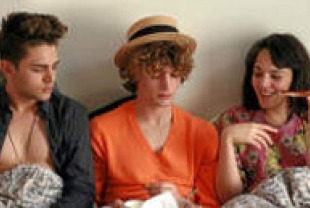"I felt as though the clouds were not on the horizon but under my feet. How sweet it was," writes actress and author Liv Ullmann about the romantic ecstasy and bliss that overtakes us when we first spot the object of our affection. We may also feel a sudden certainty that only this person can satisfy our desire and passion. We hope that this person will respond to us; if there is no response, we might well plunge into a deep depression. Our conviction that the object of our affection is nothing short of wonderful continues even in the face of any flaws and weaknesses we might uncover. All of this emotion helps make romantic love the source of the greatest happiness and the cause of the greatest disappointment.
Xavier Dolan, a young Canadian filmmaker, has fashioned a stylized and compelling portrait of the rollercoaster of emotions that accompany the ecstasies and the agonies of romantic love. Giving a nod to Godard's Jules et Jim, Dolan centers the drama around three characters, two of whom are best friends. They are Francis (Xavier Dolan), a homosexual, and Marie (Monia Chokri), a smart and sassy young woman. One day they look across a restaurant and spot Nicholas (Niels Schneider), a handsome and self-possessed Adonis-like young man with full head of curly golden locks. It is hard to tell who is more swept away by him but suffice it to say that they are both mesmerized.
When they meet, Nicholas takes an interest in both of them. He is a spoiled young man whose mother gives him a regular allowance and whose father has purchased him the apartment he lives in, where he loves to hold parties. Francis meets his mother, a glamorous former dancer, who claims that Nicholas grew up near the stage where women flocked around him as a little boy and told him how adorable he was.
Nicholas the adult is a narcissist who still relishes being the center of attention and he enjoys for a while the obvious adoration of Francis and Marie. He can't help but notice the disappointment that flickers across their faces when he gives his attention to others. And when he touches them, they respond like pleased cats. The competition between Francis and Marie reaches its apex when Nicholas takes them to a place in the countryside. Of course, by this time the main question on both of their minds: is he gay or straight or bi?
Xavier Dolan is to be commended for taking a worn-out screen genre and infusing it with fresh new life. He uses slo-mo panning shots to good effect and has a knack for melding just the right music with scenes that demand added value: an example is the playing of an Italian cover of "Bang Bang" with images of Francis and Maria walking down the streets for a showdown of sorts. The use of a series of interviews with individuals who have been unlucky in love universalizes this common feeling.
Dolan manages to make the vulnerability of both Francis and Maria appealing especially when they continuously look outwardly to Nicholas for the affirmation they lack. In addition, Francis has his shyness, and Maria her addiction to cigarettes. The closing sequences assure us that Stendhal was right when he said that for some people "Love is like a fever that comes and goes quite independently of the will."
